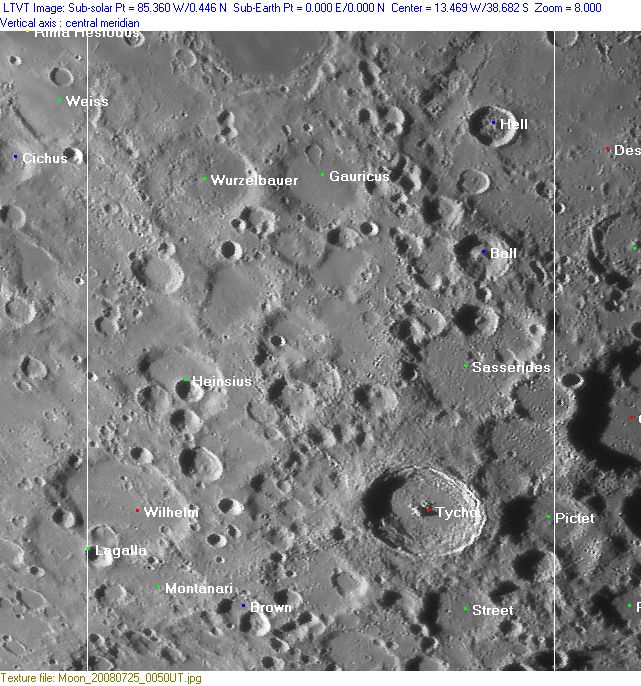Rükl 64
Contents
Rükl Zone 64 - TYCHO
Neighboring maps on the Rükl Nearside Map:
| 64 |
||
Photographic Map
(This map is based on an Earth-based photograph that has been computer-corrected to zero libration. The vertical white lines indicate the left and right boundaries of the Rükl rectangle)
Background image source
Named Features
- Ball
- Barker (a disallowed name from H.P.Wilkins for Sasserides A).
- Brown
- Catena Tycho (an unofficial name from D.Caes for the chain of small depressions north-northwest of Tycho, possibly the "source" of the western one of the bright double ejecta ray toward Weiss) (see Double Weiss ray).
- Desertum Zin (J.Hewelcke's disallowed name for the northern half of Tycho's dark halo).
- Deslandres (see Chart 65).
- Double Weiss ray (an unofficial name from D.Caes for the peculiar double ejecta ray (or rays) from Tycho toward Weiss).
- Gauricus (Van Langren's Masii).
- Granollachs (a mysterious unofficial name for Gauricus A, see Additional Information below).
- Hauet (a disallowed name from H.P.Wilkins for Wurzelbauer D) (J.Hewelcke's Mons Prophetarum).
- Hesiodus A (the most telescope-friendly one of the nearside's Concentric Craters, located near Chart 64's upper left corner).
- Heinsius (J.Hewelcke's Mons Horeb).
- Hell (Van Langren's Doriae).
- Lagalla (wrong location of name, this crater is on Chart 63; southwest of Wilhelm, northwest of Montanari).
- Longomontanus (the northern part of this quite large crater is noticeable near the lower left corner of Chart 64) (was Van Langren's Ioanni D. Sax.) (was also J.Hewelcke's Mons Annae, together with the IAU's Wilhelm).
- Luna 5 (?) (according to Wikipedia, the coordinates of the impact site of Luna 5 were firstly announced as 31° South/ 8° West, which is north of Hell; at the western part of Deslandres) (the original printed version of Antonin Rukl's atlas shows the location of Luna 5's impact craterlet southeast of Lansberg (Chart 42), while the most recent estimates show a location southwest of Copernicus, see Chart 31).
- Mons Abarim (J.Hewelcke's disallowed name for the Ball-Pitatus crater chain).
- Mons Hor (J.Hewelcke's disallowed name for Heinsius P, Q, etc.).
- Montanari
- Nirenbergeri (Van Langren's disallowed name for Wurzelbauer D).
- Pictet
- Pitatus (the southern half of this crater is noticeable slightly westward of the centre of the upper margin of Chart 64) (was Van Langren's Portus S. Francisci, J.Hewelcke's Mare Mortuum).
- Renart (a disallowed name from H.P.Wilkins for a crater south of Wurzelbauer, perhaps Wurzelbauer A?).
- Rob. Smith (J.H.Schroter's disallowed name for the officially unnamed crater between Brown D and Tycho D, southwest of Tycho).
- Sasserides
- Schupmann (a disallowed name from Ph.Fauth for Hell B at the upper right corner of Chart 64).
- Street (Van Langren's Wisilii) (on the original chart 64 printed in Rukl's Atlas of the Moon, a possible Concentric Crater (CC) is depicted on the floor of Street M (west-southwest of Street), which is a good target for telescopic photographers of the region south of Tycho!).- DannyCaes Jul 31, 2013
- Surveyor 7 (soft-landed on January 9, 1968, north of Tycho).
- Terra Fertilitatis (Riccioli's discontinued name for the whole of Chart 64).
- Tycho (Van Langren's Vladislai IV Reg. Pol., J.Hewelcke's Mons Sinai).
- Vinc. Wing (J.H.Schroter's disallowed name for the "crater" between Wilhelm D and Heinsius M, west-northwest of Tycho).
- Wilhelm (Van Langren's Wolfgangi D. Neoburgi) (was also J.Hewelcke's Mons Annae, together with the IAU's Longomontanus).
- Wurzelbauer
Lettered Crater Locations
(click on the thumbnails to view full-sized images; use browser BACK button to return to this page)
Full zone with lettered craters
Lettered craters by quadrants
(the dashed white lines are the centerlines of the Rükl zones)
| North West |
North East |
| South West |
South East |
Additional Information
- Other online descriptions of features in this Rükl map section:
The strange case of GRANOLLACHS (Gauricus A)
Several Spanish moon-websites show the mysterious name GRANOLLACHS as some sort of extra to the list of new names of Hugh Percy Wilkins (see his legendary book THE MOON).
Why is this name not mentioned in the list of Wilkins? Could somebody shed some light upon this mystery of lunar nomenclature? The name Granollachs is not mentioned in E.A.Whitaker's book Mapping and Naming the Moon (the alphabetic list of new names from H.P.Wilkins).
See also the very interesting PDF page of Spanish names on the moon :
Nombres Espanoles en la Luna





